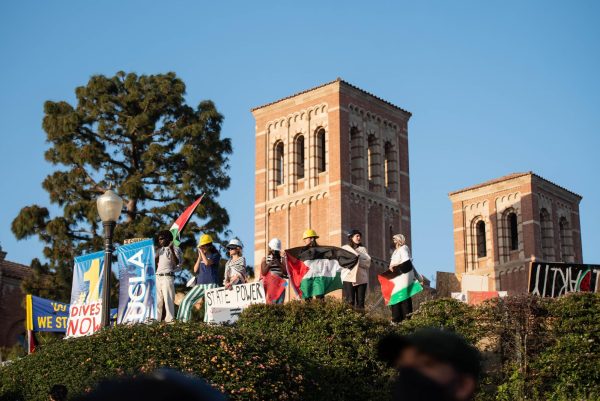
UCLA is one of the latest West Coast universities to join the global call to end Israel’s war on Palestinians in Gaza.
On April 25, pro-Palestine student groups set up multi-colored tents for an encampment-style protest in a quad area known as Dickson Plaza, located on the north side of campus.
Student and faculty protestors at UCLA are demanding that the university sever any direct or indirect financial and academic links with Israel, including divesting from companies with ties to Israel. These are the same demands adopted by other protestors nationwide and across the globe in recent weeks.
The protestors believe that by “eliminating investments in businesses that operate in or otherwise support certain countries or industries, colleges can help bring about change while ensuring they align with students’ values” (Aimee Picchi, “Some students want their colleges to divest from Israel. Here’s what that really means.” cbsnews.com, updated May 6, 2024).
The initially peaceful protest turned violent when masked pro-Israel protestors attacked the encampment by throwing objects and physically accosting many of the encampment participants. The LAPD was called to clear out the camp and stop the attack. The showdown between police and protestors took place May 1-2, with hundreds of defiant protestors arrested. Those taken into custody included UCLA students, who may face disciplinary action or dismissal.
The following is a summary of the events leading to the rise and fall of the UCLA encampment protest:
Background
The animosity between Israel and Palestine dates back to 1948 and is a long-standing conflict that has continued to this day. The most recent October 7, Hamas-led terrorist attack on Israel that killed approximately 1,200 Israelis led to the Israel-Hamas war. Afterward, the Biden administration stated that Israel would receive “whatever it needs” for its offensive against Hamas (TIME). The standing issue is Israel’s occupancy in the Gaza Strip, which is home to Palestinian civilians. Gaza’s health ministry has reported that to date, over 34,000 Palestinians were killed and thousands more injured in Israel’s military offensive on the enclave in response to the October 7 attack.
Following the October 7 attack, walkouts opposing Israel’s war on Gaza and the United States’ involvement in supporting Israel took place on the UCLA campus. These initial rallies did not receive widespread local and media coverage. According to the Daily Bruin (October 2023), “Participants…chanted phrases such as ‘From the river to the sea, Palestine will be free’ and ‘Resistance is justified when people are occupied’” (Catherine Hamilton and Dylan Winward).
One UCLA student protestor supporting the end of the war on Gaza, who wishes to remain anonymous, shares, “Before the protest, I felt helpless about the situation in Gaza and angry that our country was helping to fund the death of tens of thousands of Gazans in what I consider to be an act of genocide…I am very proud of all the brave students who contributed to the effort and I am glad that they were able to get the world talking about UCLA and more importantly, talking about Palestine.”
Student protests in the U.S. over the war recently picked up again with more vigor and media attention. On April 17, Columbia University kicked off encampment-style protests, with other colleges throughout the nation following suit in solidarity with Columbia, including UCLA.
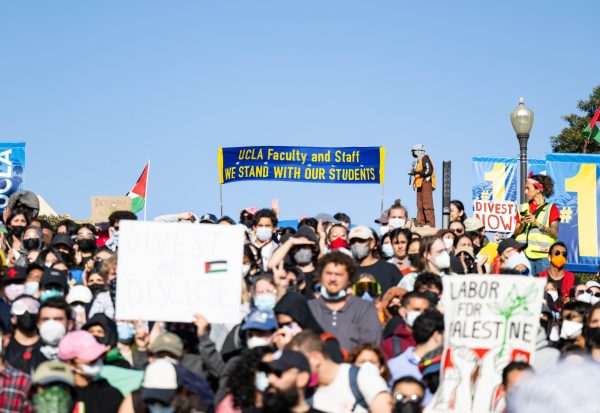
April 25-30: UCLA Pro-Palestine Groups Establish Encampment
On April 25, the UC Divest Coalition and Students for Justice in Palestine at UCLA Law set up approximately 30 tents in front of Royce Hall, calling their encampment the “UCLA Palestine Solidarity Encampment,” garnering public support through UC Divest Coalition’s Instagram account, which is currently nearing 16k followers.
The UC Divest Coalition’s goal, according to an online post, was to “demand UC divestment from the Israeli military and oppose repression of student protestors on American university campuses.” This action coincided with the 200th day of the war in Gaza. Another online post encouraged followers to join them “all day and night” until their demands were met.
Although many students did not participate in the protests due to safety concerns, the protests had significant support from behind the scenes. RK, a current UCLA student who prefers to be referred to by initials only, affirms, “…people felt a sense of powerlessness with the situation and on edge when watching people we knew getting arrested and harassed once the counter-protestors entered. But many people supported the [pro-Palestine] effort by buying supplies for the protestors and spreading the message.”
April 30-May 1: UCLA Encampment Deemed Illegal; Protestors Attacked
UCLA released a letter on April 30 to those inside the pro-Palestine encampment in Dickson Plaza saying their protest was “unlawful and violates university policy” and could result in suspension or expulsion.
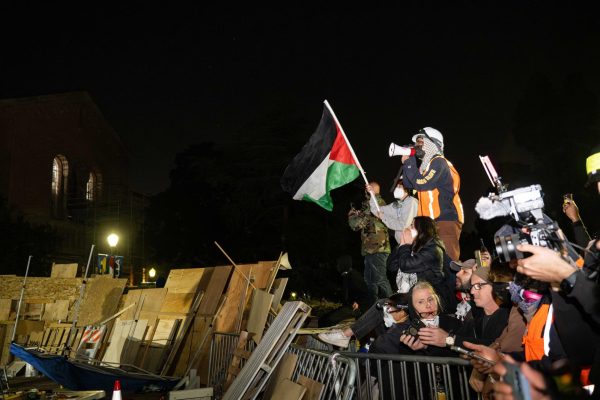
Most of the protesters chose to remain in the encampment to show support for their cause. Some protestors defaced school buildings as a part of the demonstration.
Violence soon overtook what began as protests in the name of peace when a group of men wearing white masks appeared on campus the night of April 30.
Jeremy Chen, photo editor for the Daily Bruin, recounts, “I saw violent counter-protesters attempt to breach the Palestine solidarity encampment in an attack that lasted hours before finally receiving intervention from law enforcement. The private security guards, who I believe were hired by UCLA, stood and watched as students fought off the aggressors, and once law enforcement finally arrived, no known arrests were made. Punches and kicks were thrown, and irritant gasses and miscellaneous objects filled the air. The press was not immune from these attacks. Multiple videos and accounts from that night corroborate the fact that the encampment members were peacefully protesting and only acted in self-defense once the counter-protesters arrived. This was no clash–this was an attack.”
President Biden communicated in a press statement that “in America, we respect the right to protest, the right for them to express that. But it doesn’t mean anything goes. It needs to be done without violence, without destruction, without hate, and within the law” (ABC NEWS).
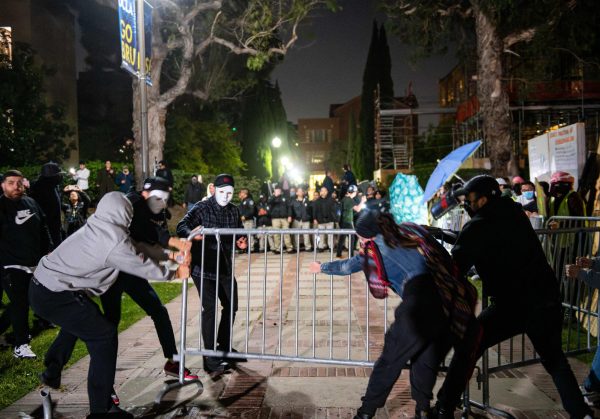
Many Jewish students openly criticized the pro-Israel counter-demonstrators and condemned their violent methods. Following the skirmish between the two opposing groups, many Jewish students reported feeling unsafe on campus. Pro-Israel groups did not respond to a request for comment.
While numerous counter-protestors and social media users condemned the pro-Palestine movement as anti-semitic, the UCLA protest participant states, “…there were several Jewish people within the encampment who supported its mission because they believe in ‘never again,’ a phrase often repeated in regards to the Holocaust, meaning never again for anyone…the encampment was not formed to disparage Jewish people, but to point to the horrendous acts being perpetrated against Palestinian people by the Israeli government and supported by the United States.”
RK adds that “…how the school handled the situation even before the attack, [such as] allowing for the non-student counter-protestors to demoralize pro-Palestinian groups and condemning the encampment for being antisemitic, exposed how they viewed the situation itself. Since UCLA preaches the importance of providing a platform for students to make a difference, many people, including myself, found the leaders’ statements hypocritical in that they were quick to silence student protestors.”
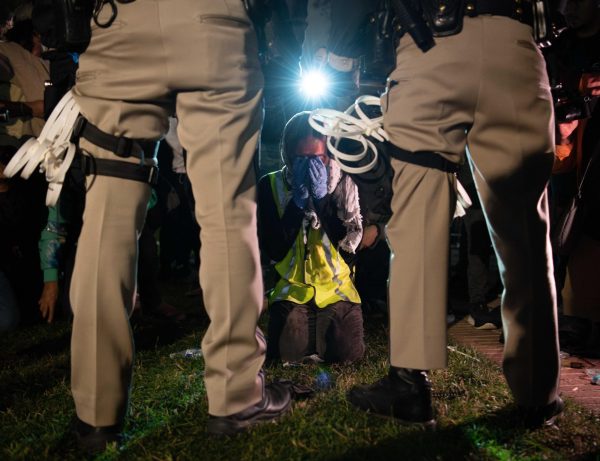
May 1-2: Police Clears Out Camp
Police told protestors early Wednesday evening of May 1 to abandon their camp or face arrests. A majority of the students remained, and over 200 people, including UCLA students, were arrested Thursday morning as police moved into the pro-Palestinian encampment, dismantling tents and pushing out protesters.
Chancellor Gene D. Block of UCLA issued a letter titled, “Our Community is in Deep Pain,” on May 2, stating, “We are reeling from days of violence and division. And we hope with all our hearts that we can return to a place where our students, faculty, and staff feel safe and, one day, connected again.”
By May 3, the camp was cleared out and only remnants of the protest remained in the Royce Hall quad area. A representative of UCLA campus police said that “It is safe to go on campus, however, the demonstration site is off limits.”
Aftermath
On May 5, Chancellor Block said in a statement that “urgent changes” were needed in the campus’ security operations and that “it is clear that UCLA needs a unit and leader whose sole responsibility is campus safety to guide us through tense times.” Rick Braziel, the former head of the Sacramento Police Department, was appointed as the leader of the new unit.
Amid these demonstrations, UCLA did not issue any statements regarding a willingness to negotiate with the protestors.
RK states that “even though students were not able to get UCLA to agree to any of their demands, I believe that the pro-Palestinian protestors contributed to the global college movement by drawing international attention to the issue and putting pressure on leaders to reconsider their stance in this conflict.”
UCLA students continue to fight for an end to the war. A sit-in was reported later Monday morning at UCLA’s Dodd Hall, where protestors, some with loudspeakers, were chanting, “Free Palestine.”


























